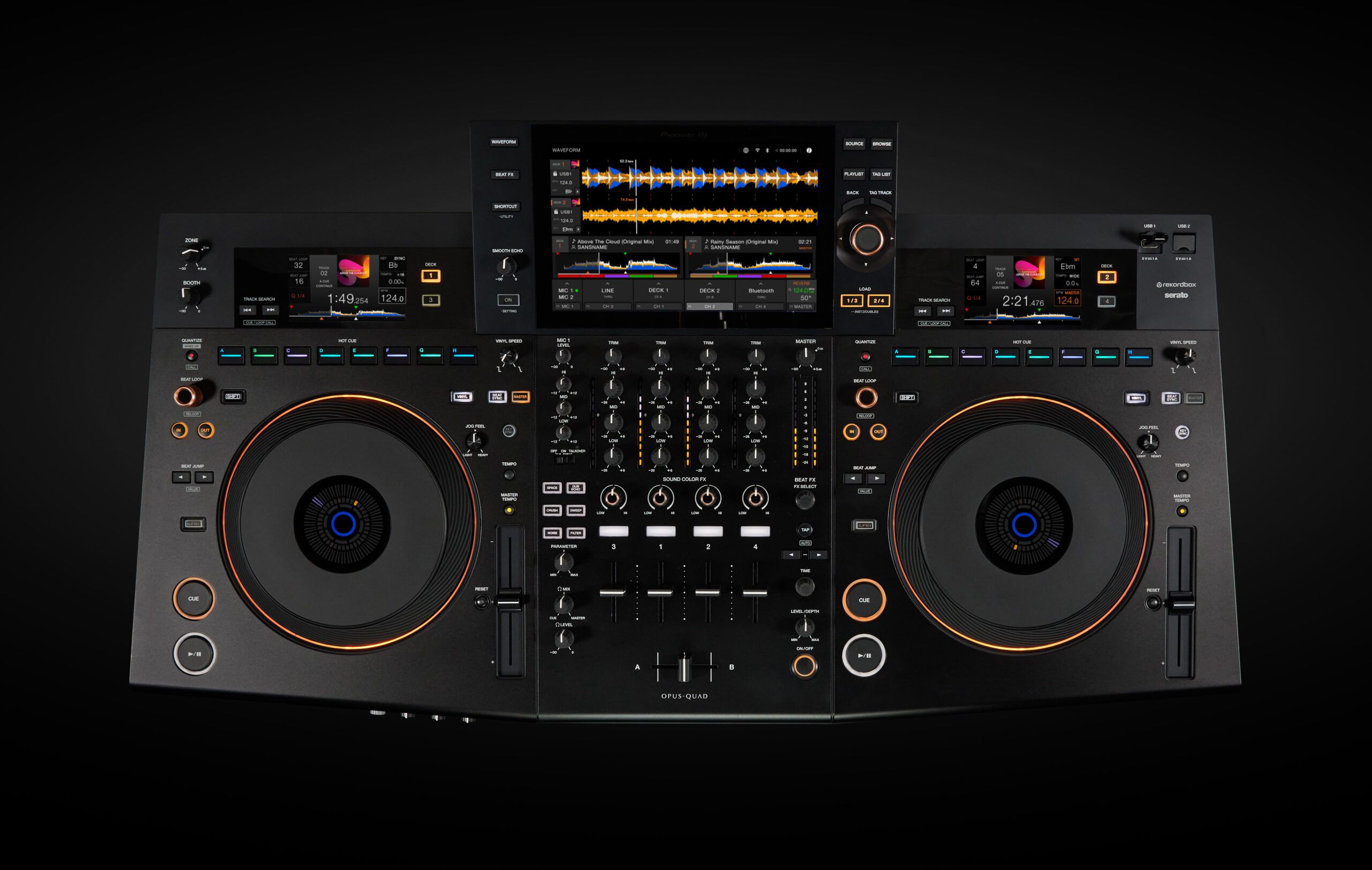Just a week after the announcement of their DJM-A9 mixer, Pioneer DJ keeps ups the momentum with the official announce of the OPUS-QUAD today. The Opus-Quad is the brand’s first all-in-one system to feature standalone 4-deck playback. It comes with an appeal to design, too – the hardware is fan shaped with a sloping top plate. Sitting at a price point of $3,199, it’s expected to be available at the end of this month.
Yes, we’ve got this all-in-one four channel standalone OPUS-QUAD
available for preorder right here in the DJ Techtools store.
Let’s take a look at the OPUS-QUAD’s major features:
- New design, new angles (literally) – This piece of gear takes a step away from the other all-in-one systems in the Pioneer family with its own unique form. The OPUS is sloped at a 5-degree angle and has a rounded front edge. The unit adds a bit of color to its body as well – externally with a matte black finish and earth-colored slits on the front and sides.
There’s a dramatically different look and design to the jog wheels, and the jog rings’ lights match whichever customizable color you choose to assign to your deck, so you’re aware of which track is playing at any given time.
Don’t forget those golden loop and browse knobs – someone’s been looking closely at the Chrome Caps!
- Standalone 4-deck playback – Play different track on each of the four decks at the same time. This is the killer feature here and why the price tag is so high. Pioneer DJ likely wants to be sure sales of the OPUS don’t impact 4-deck CDJ sales too heavily. That said, getting stock of CDJs has been a bit challenging in the current supply chain mayhem.
Anyway, four decks in a standalone is a brand new feature to the Pioneer DJ ecosystem – one that probably should have been the case on the RX3 – and one that Denon DJ has been rocking for years on their Prime ecosystem.

- 4 USB inputs for all of your media sources – including a USB Type-C port to link a device, a laptop to run your DJ software, or even a phone, plus a USB Type A port on the back panel to link an SSD drive and 2x standard USB Type-A ports

- Bluetooth + WiFi pairing – In case you need to drop in a track you couldn’t get on your USB in time: you can link your phone via Bluetooth now directly to the hardware. You can also connect your phone over WiFi to play tracks, or use rekordbox’s CloudDirectPlay
- 10.1″ touchscreen + new UI for faster crate digging – pick your tracks quickly using the keyboard or the Playlist Bank, preview your songs while you’re searching, and use the new Smart Rotary selector feature to navigate with left/right, up/down, rotation, and push control functions.

- The deck layout is dramatically different – with a display and 8 Hot Cues placed above each of the two full-sized jog wheels. Also, there’s a LOOP ENCODER! At last!
- Smart Cue – a new feature added so that you can overwrite a cue position with your recalled Hot Cues
- Play two things at once with Zone Output – if you’re looking to push sound into different spaces at once, you can use the OPUS to play a separate track via the Zone Output than the master. This is a wedding/event DJ feature that most users won’t need, but really rounds out the offering for the mobile DJs out there.
- Beat FX controls with the XY-Pad – customize your effects as easily as one finger on the XY-pad: the Beat FX parameters are controlled on the X axis, and the filter’s cut-off frequency is on the Y axis. Smooth Echo and Sound Color FX are also at your disposal here.
- Compatible with rekordbox Performance mode – and support for Serato DJ Pro is forthcoming this summer.
We suspect there’s a very good chance that we’ll see an OPUS-DUO and even perhaps a battery-powered OPUS-GO in the future – but for now, having four-deck standalone functionality in the Pioneer DJ ecosystem and signs of a new design intention for the company’s hardware is very, very welcome.
Pioneer DJ’s OPUS-QUAD is up for pre-order in the DJ TechTools shop for $3,199 – get yours here.
